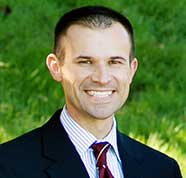October 15, 2019 — By Cory P. Hall, Collington Residency Counselor —
By Cory P. Hall, Collington Residency Counselor —
“You’re never too old to set a new goal or dream a new dream.”— C.S. Lewis
I went to visit my friend, Gene, who was staying in Collington’s on-campus Care Center, bringing only a few words of encouragement and a contingent of butterflies in my stomach. However, as is often the case for those who encountered Dr. Rice, Professor of Old Testament Language and Literature at Howard Divinity School, I left his room and our conversation with far more than when I entered.
For over five decades, Dr. Rice made these lasting impressions on his students, and, on that somber but sun-soaked Friday evening, his influence was evident by the crowd gathered outside Room # 4-29. While waiting to share a moment and a hug with Dr. Rice, it was fun to reminisce with his students. A consensus quickly emerged that Professor Rice, though the most gentle and modest man you could ever meet, had a penchant, a gift, for levying the most daunting assignments. One former student emphatically declared, “I’ll never forget that Dr. Rice gave me the most challenging homework assignment I ever received- Preach Genesis 5!”
A bit rusty, it took me a moment to realize she was talking about an extended passage of seemingly tedious, event tortuous, genealogies, commonly referred to by seminary students as “The Begats.” You know, “Person A begat Person B, lived X years, then died.” And the begetting (as the King James translation renders is) goes on and on for page after page, name after name, year after year. So, because I am a glutton for punishment, and as an homage to Dr. Rice, here’s my attempt to find meaning in all the begetting…
While scholars will undoubtedly remind us of the import of lineage and dynasty, of the primacy of primogeniture and succession in biblical history, I find it far more revealing to look at what is omitted, rather than what is included, in these detailed dynastic lists. Take our friend, Methuselah, for example, in Genesis 5:25-27, “When Methuselah had lived 187 years, he became the father of Lamech. After he became the father of Lamech, Methuselah lived 782 years and had other sons and daughters. Altogether, Methuselah lived a total of 969 years, and then he died.” Now don’t be distracted by the biblical chronology or elongated life span, but do be disturbed by the utter lack of detail about Methuselah’s life! How tragic is it that this Methuselah lived all those years, and the only thing the biblical chronicler could find to say about him is that . . . well, he died?! And Methuselah is certainly not alone. These genealogies are full of people who simply were born, begat, and died. I can almost hear Dr. Rice’s Kentucky-accented voice exhorting us now, “Let not the same be said of you!” And in his gentle, yet convicting tone, asking, pleading, “What’s your legacy? When the time comes, how will your epitaph read?”
Dr. Rice’s lesson rings true, not only for seminary students, but for octogenarians too, for the denizons of Howard Divinity School, as well as Collington Life Care Community. Our final years can be our best, as author Max Lucado reminds us in his book, “He Still Moves Stones”: Winston Churchill won the Nobel Prize in Literature at the age of 79. Ben Franklin signed the Declaration of Independence in his 70’s. And Jurist Oliver Wendell Holmes took up the study of Greek at the ripe age of 94. Not to mention Moses, who led the Israelites on a pilgrimage through the desert and the sea in his 80’s!
If you don’t take it from Moses, take it from a more contemporary, though unknowing prophet, Jack Nicholson. In his Oscar-nominated film, “About Schmidt,” Nicholson plays Warren R. Schmidt, a man who spent his entire life working for an Omaha insurance company (Notice I said “spent his entire life,” not his entire career, his entire life). We meet the 66 year-old Schmidt on the day of his retirement from Woodmen of the World Insurance Company. He’s sitting in an empty office, behind a cold desk, spending his final 4 minutes on the job like he spent the previous 40 years- watching the clock and the seconds tick away.
It’s not until he walks out the door of retirement that Schmidt realizes that while he was wasting away in that office, the world was passing him by. Ironically, it’s at his retirement banquet, over a steak dinner, a retirement plaque, and a cake shaped like his office building that Schmidt’s eyes finally begin to open. “What have I done?” he wonders. Or more pointedly, “What haven’t I done?” Only then, in his 66th year of life, does Schmidt realize, “Life is short. And I can’t afford to waste another minute.” In my favorite line of the movie, we get the “Gospel according to Schmidt,” but I think Gene Rice would agree: “I know we’re all pretty small in the big scheme of things. And I suppose the most you can hope for is to make some kind of difference. But what kind of difference have I made?”
It’s never too late to leave your legacy. Around Collington, you’ll find remarkable people heeding Gene Rice’s words, adding to their future epitaphs every day, and proving the poet, Robert Browning right when he wrote, “Grow old along with me, the best is yet to be. The last of life, for which the first was made.”